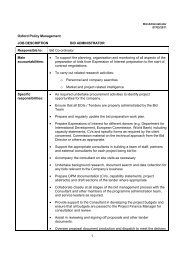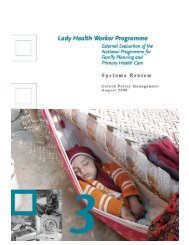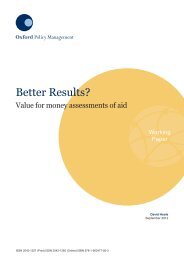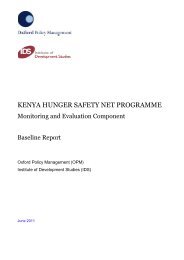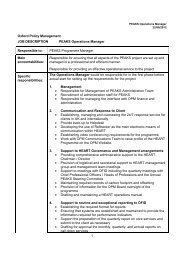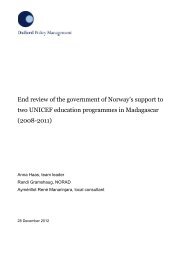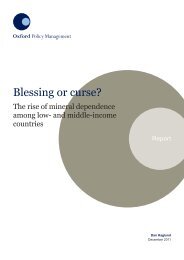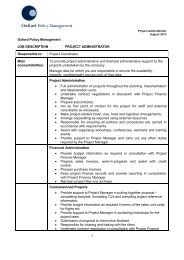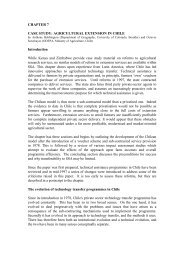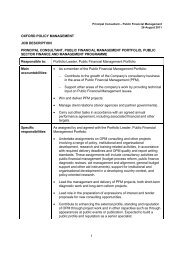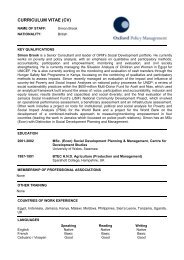LHW Management Review - Oxford Policy Management
LHW Management Review - Oxford Policy Management
LHW Management Review - Oxford Policy Management
You also want an ePaper? Increase the reach of your titles
YUMPU automatically turns print PDFs into web optimized ePapers that Google loves.
<strong>LHW</strong>P – <strong>Management</strong> <strong>Review</strong><br />
• The government and the managers of the Implementation Units know the<br />
procedures, policies and standards of the Programme even if at times there is a lack<br />
of authority to enforce compliance and to deliver sanctions for non-compliance. One<br />
solution to this weakness is the functioning of oversight committees of senior people<br />
who have influence to promote the benefits of compliance to support the resolution of<br />
difficult problems. Another is for senior management to be able to deliver more<br />
effective sanctions to non-compliant districts and provinces.<br />
• The Programme did not pilot different models for Programme operation in different<br />
districts, as it had planned to do after 2005.<br />
• Different service delivery models implemented by the provincial or district<br />
governments can have an impact on the integration of the Programme as an<br />
outreach service delivering public health services. For example, the contracting out of<br />
Basic Health Units. It is important that different service delivery models allow for the<br />
benefits of integration to be retained.<br />
4. How well has the <strong>LHW</strong>P been integrated with other Public Health Programmes?<br />
• Federally funded primary health care programmes are designed to address issues<br />
that are of national priority. It is not possible to implement these programmes without<br />
the collaboration of the provincial Departments of Health and the district Health<br />
Offices.<br />
• It is reportedly difficult to achieve policy coordination amongst the MoH’s public<br />
health programmes. The PC-1 planning process, which essentially locks in activities,<br />
does not support collaboration and inhibits flexibility and responsiveness. In addition,<br />
Programme manager report spending a lot of their management time attempting to<br />
get permission from higher authorities for initiatives that appear to be already within<br />
the framework and intent of the PC-1.<br />
• Coordinating public health services at the district level is the responsibility of the<br />
EDO-H: the day-to-day operation of the public health programmes is managed by his<br />
management team members, with whom he holds regular meetings. If there is a<br />
District Health Plan, then the <strong>LHW</strong>P is typically included in it and the District<br />
Assembly will have reviewed the plan.<br />
• The EDO-H reported that the <strong>LHW</strong>P fit best with district health priorities of mother<br />
and child health care, family planning and National Immunisation Days (NIDs).<br />
Across the country there was consensus between District Coordinators (DCs), <strong>LHW</strong>s<br />
and <strong>LHW</strong>s that the Programme’s top priority was maternal health, child health and<br />
family planning.<br />
• <strong>LHW</strong>s are spending a significant amount of time on NIDs in collaboration with the EPI<br />
programme. This activity is the result of commitments made by the government to the<br />
World Health Organisation to participate in the international goal of polio eradication.<br />
Working on NIDs does not have a negative impact on the <strong>LHW</strong>’s performance<br />
however nearly half of all <strong>LHW</strong>s are working outside their catchment area on this<br />
activity, which is against Programme policy. The high commitment in time required by<br />
<strong>LHW</strong> for NIDs needs to be monitored to ensure that other core priorities are not<br />
displaced.<br />
• The EDO-H and his DC of the Programme manage the <strong>LHW</strong>P. Many of the EDO-Hs<br />
attend, even if briefly, the monthly LHS meetings chaired by the DC.<br />
• There will always be a tension between the prescribed solutions that address<br />
National Health Priorities and the need to have some flexibility in service delivery to<br />
cater for district priorities. However there appears to be consensus between the<br />
district health management and the LHS and <strong>LHW</strong>s that the focus on service delivery<br />
should be on maternal and child health and family planning. While district managers<br />
would like an increase in budget allocation and salary incentives, there does not<br />
vi



